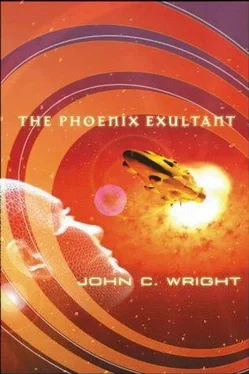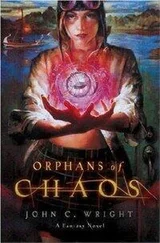Phaethon was not idle. While he waited for the self-consideration program to download, he puttered around his broken, dead, drowned house. He found the major thought-boxes and junctions, of an old-fashioned style dating back to the Sixth Era. They were complex, meant to be grown and used as a unit, and Phaethon could see why the simple Afloat folk had let Ironjoy program their houses for them rather than do it themselves. But, like most Sixth-Era equipment, it was structured after recursive mathematic techniques, the so-called holographic style, so that any fragment retained the patterns to regrow the whole.
While he waited, Phaethon opened the broken thought-boxes, stripped out the corrupt webs and wires, tested the impulse circuits till he found one in working order, made a copy of the circuit from nanomachinery in his suit, and triggered it to repair the other circuits according to that matrix, if they were repairable, or to break down and ingest circuits which were not.
The work kept his fatigue at bay. Eyes blinking, head swimming, Phaethon kept his hands busy and himself awake.
There was one unbroken sub-brain in the "basement" (which now formed the stem of his toppled house) which had an uncorrupted copy of the basic house-mind program. He spun a wire out of the reconstituted old circuits, connected it to the broken main, and suddenly Phaethon had twice the memory and computer space at his disposal. Next, a charge from his suit batteries were able to restart the house power generator. Phaethon cheered as light, white light, flamed on all over the house.
The house-mind had a plumbing routine, which was able to grow an organism of osmotic tissue. Water could be drawn one way through the tissues but not the other. Once it was connected with the capillaries meant to service the thinking-pond and staging pool, Phaethon could unleash pound after pound of absorptive material all across the flooded floors.
With great satisfaction, Phaethon watched the water level, inch by inch, begin to sink.
He then wanted to sit down. But it took fifteen minutes to convince the one dry and level surface in the house that it was a floor, and not a wall, and obey Phaethon's command to grow a carpet and mat. The wall kept insisting that, if the floor was no longer "down," then the house must be in zero gee, whereupon it extruded a hammock-net, but not a mat. Phaethon eventually fed it a false signal from the house's gyroscopic sense, to convince it that the house was rotating along its axis and producing centrifugal outward gravity.
The mat was lovely, patterned with a traditional motif of trefoils and cinquefoils.
He sat and ordered a cup of tea. But now the kitchen would only produce a spaceman's drinking bulb, which the tea service's heating wand could not enter. It seemed Phaethon would have to sip his tea cold.
He was about to get up and tear out the kitchen memory for the third time, when the green-glowing slate next to him finally chimed.
The self-consideration program was ready.
Phaethon took a sip of cold tea to brace himself, sat in a position called Open Lotus, drew a wire from his slate to the jack on his shoulder board, performed a brief Warlock breathing exercise, and opened his mind.
There he was, sipping tea from a dainty bulb, seated on a fresh-grown mat woven in the traditional style, with his hypnotic Warlock formulation-rod to one side, and his slate in reading mode on the other, tuned to the proper subchannels and ready with the proper routines, ready to undertake a thorough neural investigation, cleaning, and reconstitution.
A tea-bulb, a mat, a rod, a brain interface. All the simple and basic necessities of life. He was beginning to feel like a civilized man again.
Inside his personal thoughtspace, the self-consideration circuit opened up like a flat mirror, glowing with icons and images. It was a matter of a few moments to set the nerve-balancing subroutine into motion. It was the task of about an hour to review his major thought chains and memory indexes since his last full sleep, and to edit out the disproportionate reactions, the shadow memories, and the emotional residue clogging his thoughts.
Next, a review of command lines in his undermind showed that his subconscious desires, on several occasions, had been interpreted by his implants as commands to alter his blood-chemistry balance; the imbalances had produced subconscious neural tension; the tension had been interpreted as a further command to make additional modifications to his thalamus and hypothalamus, which had in turn affected his perceptions, moods, and memories. And these mood shifts had set in motion additional self-reinforcing cycles. It was a classic case of sleep deprivation. It was a mess.
Finally, he opened a sub-table and reviewed his emotional indicators. His frustration levels were high, but not disproportionately so, considering his circumstances. His general fear levels, normally below background threshold detection levels, had spread to involve every other area of his thought: every thought; every dream; every shade of emotion. Puzzled, Phaethon engaged an analyzer, and checked the back-linkages.
He found that his fear was linked to the thought that he was mortal. His subconscious mind had been profoundly affected by the knowledge that his noumenal backup copies had been ' destroyed. The images and allusions floating in his middle-brain grew morbid, panicked, grotesque. This, combined with the knowledge that Silent Oecumene agents were hunting him, affected his blood chemistry, nerve-rhythm, and the overall sanity of his entire mental environment.
Fascinating. Phaethon compared his general mental balance against a theoretical index. According to the index, it was not insane, or even unusual, for a mortal man being hunted by enemies to react as Phaethon had done. For example: the index opined that wrestling with Ironjoy had been a normal and understandable reaction to the fear and frustration created by Ironjoy's theft. Why? Because the thought that he was mortal meant that he only had a certain amount of time left in his life. On a subconscious level, it was as if his nerves and blood chemistry had decided that there was no time to waste negotiating with criminals.
Another file showed Phaethon the thought-images with which his subconscious mind associated his armor: he saw pictures of mighty fortresses, invulnerable castles, mythic knights of the Round Table in shining plate mail. It also showed maternal images of comfort and caring, healing his wounds, feeding him. Then there were emotion-images of loyalty and fidelity; the armor appeared in metaphor as a faithful hunting dog.
Small wonder he had reacted violently to its loss. Phaethon smiled wryly to see how his subconscious regarded the armor as his fortress, mother, and dog all wrapped up in one. Perhaps he was not as insane as he had thought he was.
In fact, out of his emotions, there were only two the self-consideration routine tagged as being abnormal. The first, oddly enough, was related to the cacophiles, the ugly monstrosities who had met him after his Curia hearing to praise his victory, and who had tried to intoxicate him with a black card. His level of disgust toward those creatures was very high; there was an abnormal desire not to think about them, to put them out of his mind. An image-box showed a half-melted lump of a body, quivering with tentacles and polyps, wearing Phaethon's face. The subconscious fear that he was somehow like them, no doubt, was what made him not want to think about them. The link chaser displayed lines of red light, to indicate that there were other reasons, deeper and stronger, as to why Phaethon did not want to think about the cacophiles. But Phaethon did not bother to follow those links. He did not want to think about it.
His second association marked as abnormal was his fear of logging on to the mentality. The index rated that as being disproportionately out of character for Phaethon.
Читать дальше











